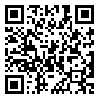BibTeX | RIS | EndNote | Medlars | ProCite | Reference Manager | RefWorks
Send citation to:
URL: http://salmandj.uswr.ac.ir/article-1-491-en.html
Objectives: Elderly is a life`s period which accompanies with some physical and mental disorders. Appearing chronic disorders may cause elderly psycho-cognition derangements. Such conditions increase the need of elderly for different assists and receiving hopefulness in order to promote their health status. This research is aimed to measure relationship of such issues upon each other.
Methods & Materials: In this descriptive and comparative study design, 84 elderly males (50 live with wife and 34 not living with wife), with chronic musculoskeletal pains, were selected. They were asked to fill-up social support, hopefulness and general health questionnaires. Data were collected and analyzed through Pearson correlation coefficient, regression analysis and student t-test via SPSS-16.
Results: Outcome revealed there are significant difference between social support, hopefulness and health status of elderly (P<0.01). Consequence analysis via regression, also showed positive effect of social support and hopefulness on elderly health status (0.01). Elderly living with their wives versus those without living with their wives, showed a significant difference in all three independent variables of social support, hopefulness and health status (P<0.01).
Conclusion: As in Iran, most population are young, soon witnessing escalation of elderly is an inevitable process. Proper planning for their health status and naturally to increase their quality of life relies upon the creation and programmed implementations in providence of 'social supports', "hopefulness" for promoting elderly `s quality of their health.
Received: 2011/12/20 | Accepted: 2012/03/20 | Published: 2012/04/01
| Rights and permissions | |
 |
This work is licensed under a Creative Commons Attribution-NonCommercial 4.0 International License. |





